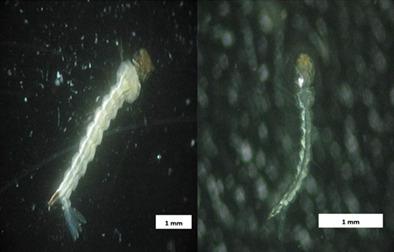当前位置:
X-MOL 学术
›
Pest Manag. Sci.
›
论文详情
Our official English website, www.x-mol.net, welcomes your
feedback! (Note: you will need to create a separate account there.)
Trypsin inhibitor from Enterolobium contortisiliquum seeds impairs Aedes aegypti development and enhances the activity of Bacillus thuringiensis toxins.
Pest Management Science ( IF 3.8 ) Pub Date : 2020-05-26 , DOI: 10.1002/ps.5918 Pedro M S Tabosa 1 , Luiz C P Almeida Filho 2 , Rute X Franca 2 , Lady Clarissa B Rocha-Bezerra 1 , Ilka M Vasconcelos 1 , Ana F U Carvalho 1, 2
Pest Management Science ( IF 3.8 ) Pub Date : 2020-05-26 , DOI: 10.1002/ps.5918 Pedro M S Tabosa 1 , Luiz C P Almeida Filho 2 , Rute X Franca 2 , Lady Clarissa B Rocha-Bezerra 1 , Ilka M Vasconcelos 1 , Ana F U Carvalho 1, 2
Affiliation

|
Disease vector insects are barriers for human development. The use of synthetic chemicals to control these vectors has caused damage to the environment and contributed to the arising of resistant insect populations. This has led to an increased search for plant‐derived molecules with insecticidal activity or that show synergistic effects with known insecticidal substances, such as protease inhibitors. Thus, we aimed to evaluate the effect of Enterolobium contortisiliquum trypsin inhibitor (EcTI) on Aedes aegypti development as well as its effect on insecticidal activity of Bacillus thuringiensis toxins.
中文翻译:

肠球菌种子的胰蛋白酶抑制剂损害埃及伊蚊的发育并增强苏云金芽孢杆菌毒素的活性。
病媒昆虫是人类发展的障碍。使用合成化学物控制这些媒介已经对环境造成破坏,并促进了抗性昆虫种群的产生。这导致人们越来越多地寻找具有杀虫活性或与已知杀虫物质(如蛋白酶抑制剂)具有协同作用的植物来源分子。因此,我们旨在评估肠球菌胰蛋白酶抑制剂(EcTI)对埃及伊蚊的发展以及其对苏云金芽孢杆菌毒素的杀虫活性的影响。
更新日期:2020-05-26
中文翻译:

肠球菌种子的胰蛋白酶抑制剂损害埃及伊蚊的发育并增强苏云金芽孢杆菌毒素的活性。
病媒昆虫是人类发展的障碍。使用合成化学物控制这些媒介已经对环境造成破坏,并促进了抗性昆虫种群的产生。这导致人们越来越多地寻找具有杀虫活性或与已知杀虫物质(如蛋白酶抑制剂)具有协同作用的植物来源分子。因此,我们旨在评估肠球菌胰蛋白酶抑制剂(EcTI)对埃及伊蚊的发展以及其对苏云金芽孢杆菌毒素的杀虫活性的影响。











































 京公网安备 11010802027423号
京公网安备 11010802027423号